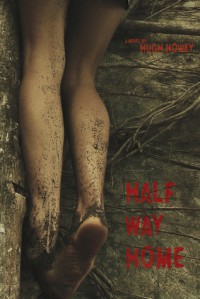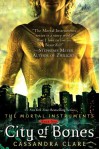 „I was a blastocyst, once. A mere jumble of cells clinging to one another. A fertilized egg. Of course, we were all in just such a state at some point in our lives, but I excelled at it in a way you didn't. I spent more time in that condition than I have as a person. Hundreds of years more, in fact.“
„I was a blastocyst, once. A mere jumble of cells clinging to one another. A fertilized egg. Of course, we were all in just such a state at some point in our lives, but I excelled at it in a way you didn't. I spent more time in that condition than I have as a person. Hundreds of years more, in fact.“ Thus begins Hugh Howey's short and sadly overlooked stand-alone young adult novel Half Way Home. If you are looking for something different among the dystopia rubble: Here you are. What is Half Way Home? It is a harsh thriller about survival. It is a study of human behavior in a freshly built, unstructured, small community. It deals with handing over the life-and-death-decisions to artificial intelligence, it serves us frienship, alien planets inhabited by huge, furry worms, a clever mystery and ... a road-trip into the unknown. What Half Way Home is not: A romance, an endless saga with multiple prequels and sequels or a piece of emotional origami.
Although intelligent machines could easily do the long trips to far away planets on their own, harvest minerals and other promising materials to take back home to Earth, mankind has chosen to spread its genes across the Universe for the sole conceited benefit of knowning that its offspring will own the future.
During the past centuries a huge number of spaceships has reached random destinations. At about half of them a detailed geological analysis done by specialized machinery suggested that the planet in question did not offer the ideal components for starting a new civilization. The complete shipments were destructed in order to save human technology from attempts at patent piracy. If the analythical reports were favorable, the onboard artificial intelligence called "Colony" - or "Al" - triggered a chemical process that started the 500 eggs to grow in their translucent tubes, to learn their specific future roles in society by virtual one-to-one sessions with said "Colony". In the 30 years the physical and mental construction of a planet's first generation took machines felled trees, tilled soil, mined and refined metal and built additional machinery with it.
When 15-years-old Porter wakes up naked and gooey in his bursting tube next to 58 other lucky colonists, who also survived the fire that suddenly started in the midst of the circularly set-up bio-vats, his half-way finished education as the colony's psychologist makes him suspicious concerning the supposedly accidental catastrophe. His unease grows when "Colony Al" instructs the survivors to concentrate on building a rocket in order to send crucial information back to Earth instead of working out solutions for temporary housing and clothing ("Colony" unconcernedly suggested tarpoline), for locating the much needed provision containers, which had been set down next to a far away area meant for mining, and for installing some kind of order. What is so important that after hundreds of years a rocket has suddenly to be sent off within two weeks? Could it be that the fire had been intended to kill them all? Could it be that "Colony" ruthlessly decided to abort the colonization process after fifteen years of successful preparation? And what can be so essentially wrong with the planet to give up the chance of populating it?
When "Colony" keeps refusing answers, food grows scarce and fanatically power-hungry splinter groups show no qualms using mortal weapons to keep their fellow colonists in check, Porter, farmer Kelvin and teacher Tarsi see no other way out than to join a handful of deserters on their way to the mining site beyond the still unpassable jungle. An exciting, dangerous journey peppered with group conflicts, hierarchy issues, hunger, want, loss, determination and character growth begins.
I liked ...
- the road-trip plot
- the Space-Odyssey-2001-like colony computer "Al" (Sounds a bit like HAL, doesn't it?) and the conflict between trusting that inanimate "thing" that brought you up and relying on yourself, your instincts, your humanity, your ability to think and decide independently
- the plot device of interrupted education: Although Porter's instructions and training modules seem to have happened randomly, his specialized syllabus had been scheduled chronologically, which means the psychological theories he has already covered include only those around the late twentieth century and earlier. Porter is aware of the fact that a large chunk of his supposed learning is missing, but he knows he has to make do with what he had been taught and that his limitations influence his world view. What he knows and what he lacks reflects on his way of solving problems, on his way of dissecting the situation his colony is in. And he realizes that his work group member Oliver, a future philosopher, has it worse than him: He is stuck in a rather primitive, religious phase, which makes him praise every misfortune and every bad turn of events as a manifestation of God's will, which he does not allow to be questioned. Some of the farmers know intricate details about the weather, but not about the actual process of producing crops. And because of the hierarchical arrangement of the bio-vats the fire destroyed the highest ranking future citizens first. Therefore there are no doctors on the planet, only nurses, no electrical engineers, only electricians and so forth, which adds to the general panic and cluelessness of the small teenaged population.
- the mystery and its solution.
- the dosage of action.
- the unique landscape and its dangers.
- the fitting cover.
What I was struggling with was (same as when I was reading Molly Fyde and the Parsona Rescue, which also recommend in spite of my luke-warm-seeming three stars) ...
- the narrator's kind of detached voice. It feels somehow distinctly male (I even thought so, when Molly was telling me her interstellar, extra-unique story) and does not invite the reader to invest much emotion. I think that is the reason why the outrageous things happing on both the Parsona's journey through space i.e. planetary genocide via nuclar weaponry and the Colony kids' jouney through the forest did not have a lasting impact on my mind. If I looked at the literature I devour with a less personal and more professional stance, I probably would be able to find the correct wording to emphasise what I mean. I hope you got a vague idea in spite of my inability to elaborate.
Contrary to other reviewers, who criticise that Porter is depicted as a very girl-like homosexual and thus puts homosexuals into a stereotypically weak corner, I believe that the main character's hesitation to act spontaneously and his occasional decision to let some other - male - friends do the hard, physical work were mainly connected to his planned academic career. Kelvin, the farmer, has a strong muscular body and is trained for intensive, manual labor, Porter, the psychologist, is rather slenderly built and tends to think things through thoroughly. So what? That's no gender thing in my opinion. And I never got the impression of Porter as a weak person. People minded what he had to say. But maybe I am too gullible and too easy to please.
Considering the low price of the e-version I recommend the book to those who appreciate non-romantic science fiction aimed at young adults without hesitation. Do have a try! I think you even can read a free except online.

















